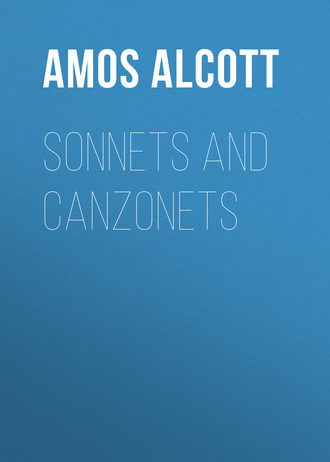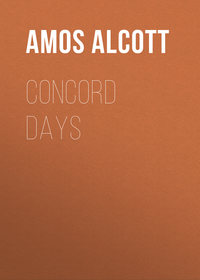Sonnets and Canzonets
 полная версия
полная версияSonnets and Canzonets
Настройки чтения
Размер шрифта
Высота строк
Поля
‘A true voice.’”
Plutarch.XThou, Sibyl rapt! whose sympathetic soulInfused the myst’ries thy tongue failed to tell;Though from thy lips the marvellous accents fell,And weird wise meanings o’er the senses stole,Through those rare cadences, with winsome spell;Yet, even in such refrainings of thy voice,There struggled up a wailing undertone,That spoke thee victim of the Sisters’ choice, —Charming all others, dwelling still alone.They left thee thus disconsolate to roam,And scorned thy dear, devoted life to spare.Around the storm-tost vessel sinking thereThe wild waves chant thy dirge and welcome home;Survives alone thy sex’s valiant plea,And the great heart that loved the brave and free.“One knocked at the Beloved’s door, and a Voice asked from within, Who is there? And he answered, It is I. Then the Voice said, This house will not hold me and thee, and the door was not opened. Then went the Lover into the desert, and fasted and prayed in solitude. And after a year he returned, and knocked again at the door. And again the Voice asked, Who is there? and he said, It is Thyself. And the door was opened to him.”
Persian Poet.XIPriest of the gladsome tidings, old and new,To whom by nature fell, as the most fit,The saintly Channing’s mantle; brave and true,Thou heedst thy calling, and dost well acquitThyself of the high mission. Thy sage wit(O brother in the Lord, and well approvedTo lead men heavenward to the Father’s throne,And Son’s that sits at His right hand beloved!)Hath ministered to every clime and zoneWashed by Pacific or Atlantic sea,With chainless flow ’neath Heaven’s unbounded cope.Son of the Church, saint of thy century!Undoubting faith is thine, and fadeless hope,And ardent, all-embracing charity.“Philosophy does not look into pedigrees. She did not receive Plato as noble, but she made him such. ”
Seneca.XIIInterpreter of the Pure Reason’s laws,And all the obligations Thought doth oweThese high ambassadors of her great cause;Philosopher! whose rare discernments showApt mastery of her surpassing skill,And why each thought and thing is inly soConceived and fashioned in the plastic Will;Thou Reason’s canons dost so well maintain,With such adhesive and sincere regard,That every deviator seeks in vainTo escape thy apprehension; evil-starred,With Dante’s sophisters they writhe in pain.Then from thy judgment-seat, dismissed with ruth,Thou lead’st the stumblers in the way of truth.“Hast thou named all the birds without a gun?Loved the wild rose and left it on its stalk?At rich men’s tables eaten bread and pulse?Unarmed, faced danger with a heart of trust?And loved so well a high behavior,In man or maid, that thou from speech refrained,Nobility more nobly to repay?Oh, be my friend, and teach me to be thine!”Emerson.XIIIWho nearer Nature’s life would truly comeMust nearest come to him of whom I speak;He all kinds knew, – the vocal and the dumb;Masterful in genius was he, and unique,Patient, sagacious, tender, frolicsome.This Concord Pan would oft his whistle take,And forth from wood and fen, field, hill, and lake,Trooping around him, in their several guise,The shy inhabitants their haunts forsake:Then he, like Esop, man would satirize,Hold up the image wild to clearest viewOf undiscerning manhood’s puzzled eyes,And mocking say, “Lo! mirrors here for you:Be true as these, if ye would be more wise.”“The happy man who lived contentWith his own town and continent,Whose chiding stream its banks did curbAs ocean circumscribes its orb,Round which, when he his walks did take,Thought he performed far more than Drake:For other lands he took less thought,Than this his Muse and landscape brought.”Evelyn.XIVMuch do they wrong our Henry, wise and kind,Morose who name thee, cynical to men,Forsaking manners civil and refinedTo build thyself in Walden woods a den, —Then flout society, flatter the rude hind.We better knew thee, loyal citizen!Thou, friendship’s all-adventuring pioneer,Civility itself didst civilize:Whilst braggart boors, wavering ’twixt rage and fear,Slave hearths lay waste, and Indian huts surprise,And swift the Martyr’s gibbet would uprear:Thou hail’dst him great whose valorous empriseOrion’s blazing belt dimmed in the sky, —Then bowed thy unrepining head to die.“Happy art thou whom God doth blessWith the full choice of thine own happiness;And happier yet, because thou’rt blestWith prudence how to choose the best:In books and gardens thou hast placed aright—Things well which thou dost understand,And both dost make with thy laborious hand—Thy noble, innocent delight.Methinks I see great Diocletian walkIn the Salonian gardens noble shade,Which by his own imperial hands was made;I see him smile, methinks, as he does talkWith the ambassadors, who come in vainTo entice him to a throne again.”Cowley’s Ode to Evelyn.XVWhilst from the cloistered schools rushed forth in viewThe eager Bachelors, on lucre bent,Or life voluptuous; even the studious few,Oblivious mostly, if they ever knewWhat Nature mirrored and fair learning meant;Thou, better taught, on worthier aims intent,Short distance from the Pilgrims’ sea-washed streetThine orchard planted; grove and garden there,And sheltering coppice hide thy mansion neat,By winding alley reached, and gay parterre;Where cordial welcome chosen friends shall meet,From courteous host and graceful lady fair;Then thy choice fruits we taste, thy wisdom hived,England’s rare Evelyn in thee revived.“Thou art not gone, being gone, – where’er thou art,Thou leav’st in him thy watchful eyes, in him thy loving heart.”Donne.XVIBright visions of my sprightlier youthful days,With sunny gleams of answering friendliness,Thou brought’st me, maiden, in delightful ways,In conversation, letters, frank address;And these attractions did me so possess,The moments all were thine, and thou in sightBy day’s engagements, and in dreams by night.Wished I the spell dissolved, or ever less?Ne’er may advancing years remove one tintFrom memory’s tablet of that happy time;And if thus tamely that romance I hint,Forgive my poor endeavor in this rhyme,Nor warrant give me now, my cherished friend,To add the more, lest I the more offend.Άστὴρ πρὶν μὲν ἔλαμπες ὲνὶ ζωοῒσιν ἑᾣος,Νὔν δἑ θαννὡ λἀνπεις Έσπερος έν φθιμένοις.“Thou wert a morning star among the livingEre thy fair light had fled;Now, being gone, thou art as Hesperus, givingNew lustre to the dead.”Plato.XVIISweet saint! whose rising dawned upon the sightLike fair Aurora chasing mists away;Our ocean billows, and thy western heightGave back reflections of the tender ray,Sparkling and smiling as night turned to day: —Ah! whither vanished that celestial light?Suns rise and set, Monadnoc’s amethystYear-long above the sullen cloud appears,Daily the waves our summer strand have kissed,But thou returnest not with days and years:Or is it thine, yon clear and beckoning star,Seen o’er the hills that guarded once thy home?Dost guide thy friend’s free steps that widely roamToward that far country where his wishes are?“Thus sing I to cragg’d clifts and hills,To sighing winds, to murmuring rills,To wasteful woods, to empty groves,Such things as my dear mind most loves.”Henry More.XVIIIAdventurous mariner! in whose gray skiff,Dashing disastrous o’er the fretful wave,The steersman, subject to each breeze’s whiff,Or blast capricious that o’er seas doth rave,Scarce turns his rudder from the fatal cliff, —Scorning his craft or e’en himself to save.Ye Powers of air, that shift the seaman’s grave,Adjust the tackle of his right intent,And bring him safely to the port he meant!Long musing there on that divinityWho to his hazard had assistance lent,He verses cons, oft taken by surpriseIn diverse meanings, and shrewd subtlety,That pass quaint Donne, and even Shakespeare wise.“But else, in deep of night, when drowsinessHath locked up mortal sense, then listen ITo the celestial Syrens’ harmonyThat sit upon the nine infolded spheres,And sing to those that hold the vital shears,And turn the adamantine spindle round,On which the fate of gods and men is wound.”Milton.XIXRomancer, far more coy than that coy sex!Perchance some stroke of magic thee befell,Ere thy baronial keep the Muse did vex,Nor grant deliverance from enchanted spell,But tease thee all the while and sore perplex,Till thou that wizard tale shouldst fairly tell,Better than poets in thy own clear prose.Painter of sin in its deep scarlet dyes,Thy doomsday pencil Justice doth expose,Hearing and judging at the dread assize;New England’s guilt blazoning before all eyes,No other chronicler than thee she chose.Magician deathless! dost thou vigil keep,Whilst ’neath our pines thou feignest deathlike sleep?“There is a Roman splendor in her smile,A tenderness that owes its depth to toil;Well may she leave the soft voluptuous wile,That forms the woman of a softer soil;She does pour forth herself a fragrant oil,Upon the dark asperities of Fate,And make a garden else all desolate.”Ellery Channing.XXStill held in sweet remembrance thou, my friend,As when I knew thee in thy maiden prime;Though later years to ripening graces lendThe graver traits, whilst we together climbThe pathway upward to those loftier heights,’Bove clouded prospects and familiar sights.Thy gracious worth shines brightly in mine eyes,Thy warm heart’s labors, thy large liberal brain,Ennobling studies, and broad charities,Thou woman worthy of the coming age!Whilst household duties thou dost well sustain,Yet ampler service for thy sex presage;Can aught from Memory’s record e’er eraseThy cordial manners, and resplendent face?“So have I seen in fair Castile,The youth in glittering squadrons start,Sudden the flying jennet wheel,And hurl the unexpected dart.”Scott.XXIPoet of the Pulpit, whose full-chorded lyreStartles the churches from their slumbers late,Discoursing music, mixed with lofty ire,At wrangling factions in the restless state,Till tingles with thy note each listening ear, —Then household charities by the friendly fireOf home, soothe all to fellowship and good cheer.No sin escapes thy fervent eloquence,Yet, touching with compassion the true word,Thou leavest the trembling culprit’s dark offenceTo the mediation of his gracious Lord.To noble thought and deep dost thou dispenseDue meed of praise, strict in thy just award.Can other pulpits with this preacher cope?I glory in thy genius, and take hope!“Many are the friends of the golden tongue.”Welsh Triad.XXIIPeople’s Attorney, servant of the Right!Pleader for all shades of the solar ray,Complexions dusky, yellow, red, or white;Who, in thy country’s and thy time’s despite,Hast only questioned, What will Duty say?And followed swiftly in her narrow way:Tipped is thy tongue with golden eloquence,All honeyed accents fall from off thy lips, —Each eager listener his full measure sips,Yet runs to waste the sparkling opulence, —The scorn of bigots, and the worldling’s flout.If Time long held thy merit in suspense,Hastening repentant now, with pen devout,Impartial History dare not leave thee out.“Who faithful in insane sedition keeps,With silver and with ruddy gold may vie.”Tyrtæus.XXIII’Twas when the land was struggling to break freeFrom Slavery’s fetter and provincial ban,Whilst a great people dreaded liberty, —That the dire conflict of thine age began.Thy voice rang clear o’er selfish sect and clan;Nor politician’s, priest’s, nor tradesman’s pleaDid aught avail to quench, but more to fanThe flame that must consume all slavery, —The serf then franchised and proclaimed a man.Long wast thou heard amid the scoff and scornOf voices potent in thy city dear;Steadfast didst face the storm, with heart of cheer,And prove thyself the freeman nobly born,Preacher of righteousness, of saints the peer.“Nothing is here for tears, nothing to wailOr knock the breast, no weakness, no contempt,Dispraise or blame, nothing but well and fair,And what may quiet us in a death so noble.”Milton.XXIVBold Saint, thou firm believer in the Cross,Again made glorious by self-sacrifice, —Love’s free atonement given without love’s loss, —That martyrdom to thee was lighter pain,Since thus a race its liberties should gain;Flash its sure consequence in Slavery’s eyesWhen, ’scaping sabre’s clash and battle’s smoke,She felt the justice of thy master-stroke:Peaceful prosperity around us lies,Freedom with loyalty thy valor gave;Whilst thou, no felon doomed, for gallows fit,O Patriot true! O Christian meek and brave!Throned in the martyrs’ seat henceforth shalt sit;Prophet of God! Messias of the Slave!“O my brethren! I have toldMost bitter truth, but without bitterness,Nor deem my zeal or factious or mistimed;For never can true courage dwell with themWho, playing tricks with conscience, dare not lookAt their own vices.”Coleridge.XXVNobly censorious of our transient age,Hating oppressors in thy love of man,Thou didst stride forward on the public stageWith the bold liberators to the van,Scourging delinquents with a lofty rage.Iconoclast, who ’gainst foul idols ran,Tumbling false gods from their wide-worshipped shrine,To throne therein the human and divine.Charged was thy soul with vehement eloquence,Strenuous with ample reason’s manly art;Thy prayers were fervent, void of all pretence,Wrath yielded place to pity in thy heart;Eagerly of all learning mad’st thou spoil,Before thy lamp, extinguished, spent its oil.“There’s not a breathing of the common windThat will forget thee: thou hast great allies;Thy friends are exultations, agonies,And love, and man’s unconquerable mind.”Wordsworth.XXVIFreedom’s first champion in our fettered land!Nor politician nor base citizenCould gibbet thee, nor silence, nor withstand.Thy trenchant and emancipating penThe patriot Lincoln snatched with steady hand,Writing his name and thine on parchment white,Midst war’s resistless and ensanguined flood;Then held that proclamation high in sightBefore his fratricidal countrymen, —“Freedom henceforth throughout the land for all,” —And sealed the instrument with his own blood,Bowing his mighty strength for slavery’s fall;Whilst thou, stanch friend of largest liberty,Survived, – its ruin and our peace to see.“E venni dal martirio a questa pace.”Dante.“Ah, me! how dark the discipline of pain,Were not the suffering followed by the senseOf infinite rest and infinite release!This is our consolation; and againA great soul cries to us in our suspense:‘I came from martyrdom unto this peace.’”Longfellow.XXVIIIO thou, my country, ope thine eyesToward what the Future holds for thee!See the brave stripling riseFrom lowliest hut and poverty,From stair to stair;Nor hardly fix his footsteps there,Ere he another roundDoth upward bound;Still, step by step, to higher stairForward he leaps,Broader his vision sweeps,Till he the loftiest summit gain, —A people’s hope to further and maintain.IIBut lo! as oft befalls the great,The wise and good,There for a moment poised he stood, —Then passed beyond the gazing crowdWithin the folded cloud.Wasted by weary pains,His pale remainsNow lie in state,Swathed in his bloody shroud;Peoples and kingdoms bathed in tears.Hear’st thou the welcome greet his ears,As he his holier throne doth take?This brave of fifty manly years,Dies he not now for thy dear sake?IIIO follow, thou, his leading far,Be thou thyself the morning star,Beaming thy glories round the world,His name emblazoned on thy flag unfurled!What speak the myriad bells,Tolling this day their mournful knells?“Ne’er may our weight be swung,Never our iron tongueSlavery’s base might extolIn town or capitol;But o’er a people brave and freeRing out in happier symphonyGarfield and Liberty!”




